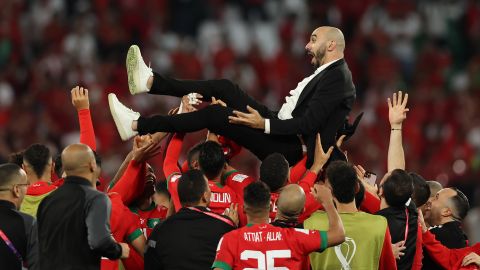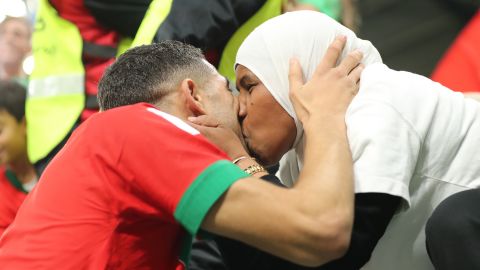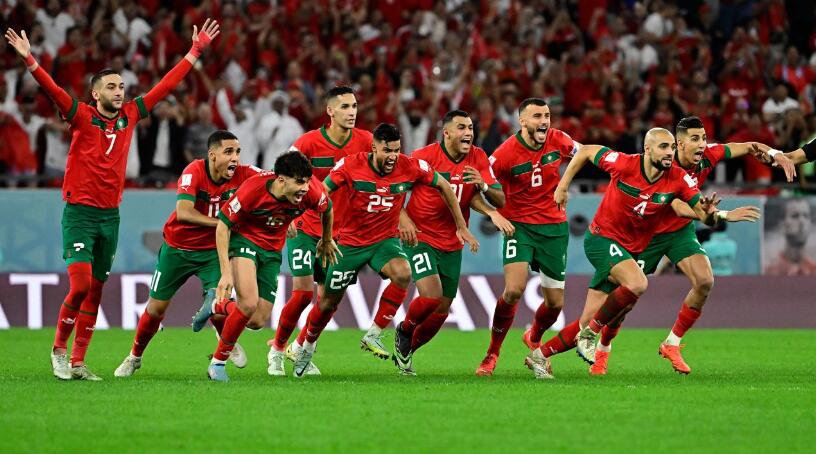Why Morocco’s World Cup success is no fluke
After three hours of constant noise, the Education City Stadium was brought to library-like silence as Achraf Hakimi stood over the penalty spot.
Hakimi was born in Madrid and the the weight of Africa and the Arab world on his shoulders, but you would never have guessed as the Paris Saint-Germain coolly clipped the ball into the net and set off wild celebrations not just in the stadium, but also in Morocco and for the Moroccan diaspora.
This was a historic day for Morocco, for Africa, for Arabs and for Muslims. The Atlas Lions had roared to stun 2010 World Cup winner Spain and reach the quarterfinals of Qatar 2022. The significance of the occasion was not lost on head coach Walid Regragui.
“Before it was just the Moroccans who supported us,” he said ahead of the game against Spain. “Now it is the Africans and Arabs.”
For many, it was the shock of the tournament, as the North Africans won their first ever knockout game at a World Cup.
On Saturday, Morocco went one better, beating Portugal 1-0 in the quarterfinals to become the first African team to reach a World Cup semifinal.
Youssef En-Nesyri netted the only goal of the match ijust before half time with a spectacular header to score the first ever knockout stage goal in the nation’s history.
But how did Morocco get to the final four of the most prestigious competition in world football?
Return of Morocco’s chosen son
Many eyebrows were raised when the Moroccan Federation made the decision to sack Vahid Halilhodžić in August, just over three months ahead of the World Cup after the Bosnian coach had guided the team through qualifying to Qatar 2022.
But for those in Morocco, it was instead the heir to the Moroccan coaching throne simply taking his place at the perfect time.
Affectionately nicknamed “Rass l’Avocat” (Avocado Head) because of his bald head, Regragui was a hard-tackling defender who, despite being born in France, chose to represent the nation of his family, notching up 45 caps.

Since becoming a coach, Regragui has enjoyed success everywhere he has been, leading a mid-table Moroccan club FUS Rabat to their only ever league title.
He had a brief stint in Qatar where he won the league with Al Duhail SC, before moving back to Morocco where he led Wydad Cassablanca to a league and Champions League double earlier this year.
It was a matter of when, not if he would take charge of the national team. Many Moroccans thought that it could be after the World Cup or in a few years, but none were unhappy when it was announced he would take over the national side less than 100 days before their first game at the World Cup.
In African football, Regragui has often been compared with José Mourinho thanks to his tactical discipline and stellar man-management skills. Both of those have been present in the World Cup.
Morocco has played more than 400 minutes of football at the tournament and negotiated a penalty shootout, and yet the Atlas Lions have conceded just once – and that was an unfortunate own goal against Canada in the team’s final Goup F match.
After the dramatic shootout win against Spain, video circulated on social media of Regragui running to the stands and hugging and kissing his mother who was in the crowd.
Regragui is a French-born Moroccan. He has assembled the most nationally diverse team at the World Cup – 14 of the 26 players were born outside of Morocco from six different countries – and has seamlessly integrated this group players from around the world into one coherent unit.
World Cup tournaments can be tough emotionally to navigate – players are away from home for weeks – but Regragui has counteracted that by allowing the players’ families to stay with the team in camp in Qatar.
As with that of emotional video of Regragui embracing his mother, one of the most heartwarming photos of the World Cup was Hakimi kissing his mother after Morocco’s victory against Spain.

It’s not only the players who have had their families with them. Regragui himself was filmed going to the stands to visit his mother Fatima who told Morocco broadcaster Arriyadia how much it meant to her.
“During his whole career as a player and as a coach, I never traveled to watch him,” Fatima said. “I’ve been living in France for more than 50 years now and this is the first competition that I left Paris for.”
A Federation taking football seriously
The Royal Moroccan Football Federation (FMRF) should also be credited with the Atlas Lions’ success at Qatar 2022.
After decades of footballing mediocrity, the FMRF – with the backing of King Mohammed VI – decided to overhaul the nation’s football structure.
In 2009 the FMRF opened its national football academy, the Mohamed VI Football Academy – which helped develop current international players like Nayef Aguerd and Youssef En-Nesryi – as well as trying to unearth talent in the Moroccan diaspora by employing scouts from across Europe to flag any eligible youth players in Europe.
The federation also began investing in women’s football, developing football in schools and clubs as well as a creating a national league structure. Funded by the FMRF, Morocco is currently the only nation in the world to have two tiers of women’s football that are both fully professional.
The crown jewel of Morocco’s football investment is the Mohamed VI Football Complex just outside Rabat.
The training complex contains four five-star hotels, eight FIFA standard pitches – one of which is indoor in a climate-controled building – as well a medical facility that includes a dentist.
That investment over the last decade has begun to pay off.
For the first time in history, Moroccan clubs are the holders of the men’s and women’s African Champions League titles as well the men’s Confederations Cup – Africa’s Europa League.
Morocco is also the African Nations Championship champion – a continental tournament where nations put out teams exclusively featuring players who play domestically – while the women’s team came second in the Women’s Africa Cup of Nations earlier this year and qualified for its first World Cup.
Morocco’s success at the World Cup may be best story of the tournament so far, but it is not the not the result of luck and grit, but rather expertise and planning.
